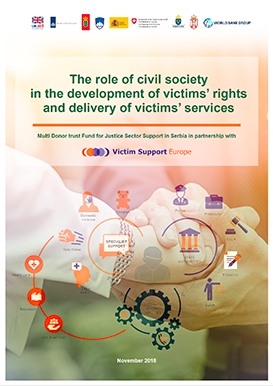 The MDTF-JSS team in partnership with Victim support Europe prepared report The role of civil society in the development of victims’ rights and delivery of victims’ services to explore interaction between states and non-governmental organizations (NGOs) in the delivery of support to victims of crimes. As Serbia is moving forward with its engagement to implement Directive 2012/29/EU establishing minimum standards on the rights, support and protection of victims of crime the question of who will provide support services for victims needs to be answered.
The MDTF-JSS team in partnership with Victim support Europe prepared report The role of civil society in the development of victims’ rights and delivery of victims’ services to explore interaction between states and non-governmental organizations (NGOs) in the delivery of support to victims of crimes. As Serbia is moving forward with its engagement to implement Directive 2012/29/EU establishing minimum standards on the rights, support and protection of victims of crime the question of who will provide support services for victims needs to be answered.
The report is based on data collected through desk research, a survey and a comparative study to ensure combination of legislative and practical insight. A survey was conducted, looking into experiences of both NGO and governmental actors working in the field of victim support. A total of 32 stakeholders from 18 European states responded, with NGOs consisting of 58 percent of respondents with the remaining 42 percent consisting of other entities primarily from the State. Practical experiences of European countries ensure that Serbian authorities could learn from their peers who already faced with challenges in implementation of victim support system. A comparative study looks at three countries – Croatia, Hungary and Portugal. These three countries were selected as each implements victim support differently: in Portugal, generic support is provided, almost solely, by one national NGO; in Croatia, NGOs and governmental support structures are present in different forms through different regions and cooperate in different ways; while Hungary has two, parallel, state-wide generic victim support organizations – one governmental, the other an NGO. A number of victim support experts were interviewed, to better understand the specific role that NGOs do, and may, play in the provision of victim support services.
The report looked into certain aspects of the provision of victim support services, aiming to establish the relevance and impact of the involvement of state and NGOs in responding to different needs of victims. The objective was to identify some of the key principles of delivering services which make those services victim centric and as effective and efficient as possible. Those factors are derived from a combination of obligations and recitals in the EU Victims Directive, quality standards that have been identified in the other World Bank reports, and discussions with victim support organizations and victims on what makes a victim support service successful.
The analysis focused on several aspects of victim support: the availability of different most frequently required services; the flexibility of different actors to respond to different victims’ needs and hence make services effectively available to victims (e.g. to respond at different times of the day and week or at different locations, as well as to be able to adapt to changing victims’ needs); ability to motivate staff and recruit volunteers; engagement in training of staff and volunteers; as well as the cost-effectiveness of different types of services, depending on whether they are provided by the state or NGOs.
The report indicates that non-state actors are better placed to deliver support to victims of crimes. Consultation with stakeholders, which involved more than 40 percent of state actors, concludes that on all aspects of delivery of services for victims, NGOs are in a far better position to deliver better care, than state actors.
While NGOs may be better placed to provide many of these services to victims in an accessible, flexible and cost-effective manner, it is still the responsibility of the state to create an environment in which NGOs can effectively operate. To ensure sustainability and stability of NGO work, it is important to secure stable sufficient sources of funding. Experience shows that even with a relatively modest investment much can be achieved; however, more sustainable funds can ensure a more comprehensive arrangement of services to support victims of crimes.
The report puts forward several recommendations for Serbian stakeholders to follow in their endeavour towards the introduction of victim support services.
The report is also available in
Serbian.
 The MDTF-JSS team in partnership with Victim support Europe prepared report The role of civil society in the development of victims’ rights and delivery of victims’ services to explore interaction between states and non-governmental organizations (NGOs) in the delivery of support to victims of crimes. As Serbia is moving forward with its engagement to implement Directive 2012/29/EU establishing minimum standards on the rights, support and protection of victims of crime the question of who will provide support services for victims needs to be answered.
The MDTF-JSS team in partnership with Victim support Europe prepared report The role of civil society in the development of victims’ rights and delivery of victims’ services to explore interaction between states and non-governmental organizations (NGOs) in the delivery of support to victims of crimes. As Serbia is moving forward with its engagement to implement Directive 2012/29/EU establishing minimum standards on the rights, support and protection of victims of crime the question of who will provide support services for victims needs to be answered.